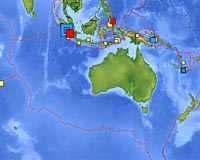 |
Sydney (AFP) Oct 11, 2009 A sudden cluster of massive earthquakes which has shaken Asia-Pacific communities and likely left thousands dead has also jolted some scientists, who are starting to question conventional thought. Experts who dismissed notions that far-away quakes could be linked are beginning to think again after huge tremors rocked Samoa and Indonesia on the same day, followed by another major convulsion in Vanuatu. Some 184 people died in the terrifying tsunami which smashed Samoa, American Samoa and Tonga on September 30, while thousands are feared dead after parts of Indonesia's Padang city were reduced to rubble just hours later. On Thursday, thousands of panicked people fled the coast as a rapid succession of large quakes off Vanuatu set off a tsunami warning for much of the South Pacific. The "remarkable" sequence has prompted veteran earthquake-watcher Gary Gibson to tear up his theory it was all down to chance and search for a possible connection. "I can no longer keep using the response it's all a big coincidence, can I?" Gibson, senior seismologist at Environmental Systems and Services consulting group, told AFP. "But what would the (link) mechanism be? Nobody has come up with a good story." University of Queensland's Huilin Xing also challenged accepted science by proposing a possible link between the Samoan and Indonesian earthquakes -- 6,000 miles (9,660 kilometres) apart. Xing said the fast-moving Australian tectonic plate may have set off one quake, and then the other. "From the observations, there were similar correlations of the quakes in the different places," Xing said. "For two great earthquakes to occur within hours in such a way, it is abnormal." Thursday's 7.6, 7.8 and 7.3 Vanuatu earthquakes also came just minutes after another large tremor shook the Philippines. "It's remarkable. I've been working on this for 30 years and never seen it before," said Gibson. "Many times it's chance but when you get this many large earthquakes on the Australian plate boundary it's stretching the concept of just coincidence. But nobody I know has published a link that will stand up in all cases. "There's no mechanism to describe why it's happening that anybody's thought of. I personally think there may well be something else and I'm continuing to look for it." Kevin McCue, president of the Australian Earthquake Engineering Society, rejected ideas of any connection between the Pacific and Indonesian quakes, but said the tremors in Samoa and Vanuatu had a historical precursor. McCue said in 1917 a major earthquake rocked Samoa, followed three years later by another of similar size off Vanuatu, with both going off close to the recent quakes' epicentres. But he said the high activity in different areas was simply part of the random nature of earthquakes. "It's just the nature of the beast -- you have a cluster of events then you wait months without one," he said. "(But) I don't deny that I don't know something. It is possible there's something more. We don't know what's happening down there, really." Share This Article With Planet Earth
Related Links Tectonic Science and News
 Indonesia quake zone a disaster waiting to happen: scientists
Indonesia quake zone a disaster waiting to happen: scientistsJakarta (AFP) Oct 1, 2009 Scientists have warned for years that the Indonesian city of Padang is a disaster waiting to happen because of strain on a nearby fault-line. After this week's quake they say worse is still to come. The city on Sumatra island is located between two lines of high seismic activity - the Great Sumatran fault on the mainland to the east, and the Sumatra trench, also called the Sunda trench, und ... read more |
|
| The content herein, unless otherwise known to be public domain, are Copyright 1995-2009 - SpaceDaily. AFP and UPI Wire Stories are copyright Agence France-Presse and United Press International. ESA Portal Reports are copyright European Space Agency. All NASA sourced material is public domain. Additional copyrights may apply in whole or part to other bona fide parties. Advertising does not imply endorsement,agreement or approval of any opinions, statements or information provided by SpaceDaily on any Web page published or hosted by SpaceDaily. Privacy Statement |